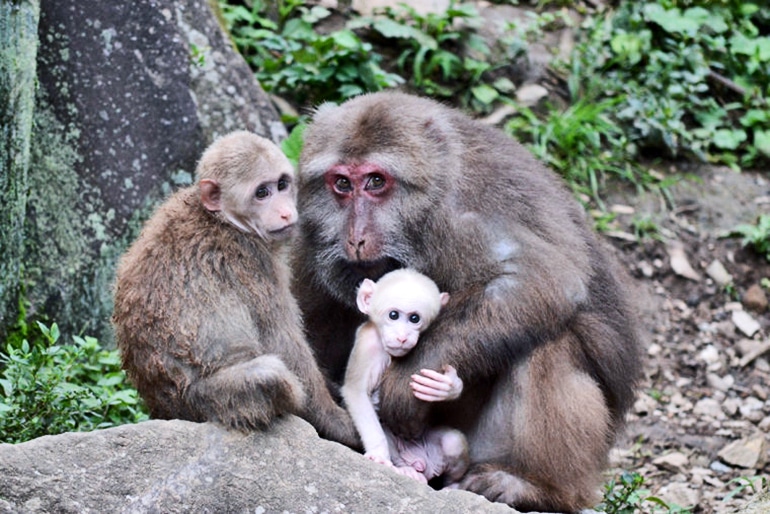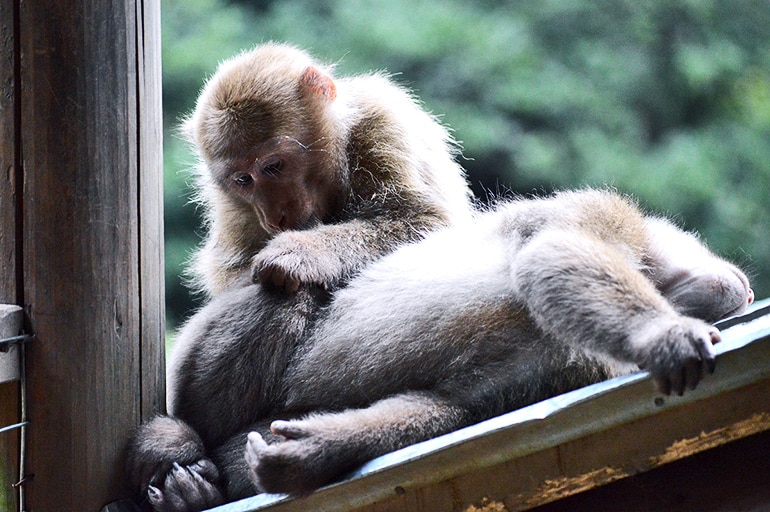What Animals Have The Complex Social Lifestyle
Researchers may be missing the more than complex social interactions between primates like chimpanzees and macaques, according to a new report.
"Our report confirms that the social relationships of nonhuman primates are extremely complicated, nuanced, and multi-faceted," says Jake Funkhouser, atomic number 82 author of the study and an anthropology doctoral educatee in Arts & Sciences at Washington University in St. Louis.
"It as well suggests that existing research techniques for observing and measuring dominance are missing components of complexity that are critical for understanding the layers of diverse social relationships we see in the animal kingdom, our own man societies included," Funkhouser says.
One-dimensional view
Primatologists, such as Jane Goodall, Biruté Galdikas, and Dian Fossey, have been studying primate beliefs for decades, so the idea that chimpanzees and other primates have complex social relationships is nothing new.
While Funkhouser and colleagues affirm the importance of understanding these relationships, they argue that many long-established methodologies for assessing primate power struggles—observations of fighting over food or mates—may be too one-dimensional to capture the very complex social dynamics of primate relationships.

"The social relationships humans share with others cannot be accurately represented in simply 'dominant' or 'subordinate' terms," Funkhouser says. "Nor practice our relationships readily transfer between settings; the aggressive or confrontational interactions nosotros engage in with some are much different than the prosocial interactions nosotros share with our spouse and all-time friends.
"Primate social relationships likewise are highly individualized and dependent on the partners involved and the social setting in which the interaction takes place. As the primate species with the most complex sociality, we humans should understand this pretty well," he says.
What's dominance got to do with it?
Across the animal kingdom, researchers have used the term "social authorisation" as a descriptive autograph to convey the behavioral characteristics and power status of individual animals and simplify the overall structure of social relationships within groups. However, investigators often differ in their definitions of authorization, the methods used to derive say-so and the statistical techniques used to rank individuals in a group.
"This is precisely the problem we fix out to explore," Funkhouser says.
In this study, Funkhouser and colleagues captured detailed behavioral information from the observation of convict chimpanzees at Chimpanzee Sanctuary Northwest in Cle Elum, Washington, and of wild Tibetan macaques of Mt. Huangshan in the Anhui Province of Mainland china.
Past running these same behavioral data sets through a series of 69 unlike statistical analyses, they could compare and contrast how diverse methodologies ranked individuals' condition and how these structures of dominance predicted patterns of other social behavior within the groups.
"When distilled, this newspaper simply highlights something intuitive about what existence dominant means for a social creature: that social context matters," says coauthor Jessica A. Mayhew, director of the Primate Beliefs and Environmental program and assistant professor of anthropology and museum studies at Central Washington University.
"The perception that authority is solely virtually aggression, in other words who 'wins' and who 'loses' a competition, is just ane piece of the larger group social dynamics," Mayhew says. "It'due south critical that equally researchers nosotros continue to admit the context in which we collect our information because it influences our interpretation."
Who's really alpha?
To exemplify this, at Chimpanzee Sanctuary Northwest, the electric current study found that Jamie, an adult female chimpanzee who was retired from biomedical inquiry, directs a lot of aggression toward the other chimpanzees. Therefore, through a competitive lens, researchers calculated Jamie to exist the nigh dominant.
However, Negra—an older developed female chimpanzee who was captured in the wild as an baby, used in biomedical research, and then retired—rarely engages in aggressive interactions merely is most frequently the recipient of the groups' grooming efforts.
In Negra's case, researchers calculated her to be most ascendant via the occupation of a privileged, or "respected," role in the group. These different results correspond with observations of chimpanzees' extremely complex and fluid social systems in the wild.
On the other hand, researchers oft detect that wild Tibetan macaques have much stricter social rules, and this study picked up on those trends as well. These macaques follow species-typical trends and maintain 1, more often than not generalizable, authorisation hierarchy that is stable across social contexts.
For instance, young adult males TouGui and YeRongBing forth with GouShan, a much older male, occupy the top of the potency hierarchy, while females YeZhen, TouRongYu and TouTai occupy the bottom of the hierarchy.

"Power dynamics among primates can have life or death outcomes; being an alpha can mean that a primate has admission to higher quality nutrient or more mates. The study of animal social relationships has been transformed over the past decade by a suite of new methods and analytical tools," says Crickette Sanz, an associate professor of physical anthropology at Washington University who is working with Funkhouser on his doctoral work.
"This study shows how these tools can exist used to improve empathize social relationships amongst chimpanzees and macaques, two species with reputations for beingness highly political," Sanz says.
Source: Washington University in St. Louis
Source: https://www.futurity.org/primates-relationships-1875162/
Posted by: hookthonegive.blogspot.com

0 Response to "What Animals Have The Complex Social Lifestyle"
Post a Comment